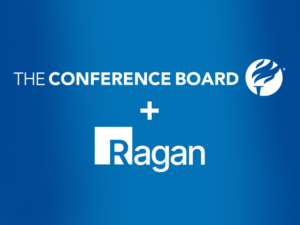The Consumer Bankers Association’s Billy Rielly on the future of corporate comms
The Consumer Bankers Association Head of Public Affairs discusses crisis management, the dangers of AI in banking and the communicator’s role as advisors to the C-Suite.

Billy Rielly, senior vice president and head of Public Affairs at Consumer Bankers Association, has been named one of Ragan’s 2023 Game Changers, sponsored by Omnicom, an honor that recognizes trailblazing leaders in the communications and PR industries.
“My career is uniquely DC and really focused on politics, public policy and I now have one foot in the door in the comms world,” said Reilly. His journey began with work for his home state senator right after college, gaining a broad overview of the political policy communications landscape. Reilly later became a communications director for a member of the House of Representatives, which coincided with the pandemic.
Reilly has dedicated his professional life to politics, public policy, and corporate advocacy, and it led him to join the Consumer Bankers Association three years ago. He is uniquely positioned to bridge the gap between political, regulatory, and industry perspectives.
To set the stage for his recognition at Ragan’s Future of Communications Conference, Nov. 6–8 in Austin, we asked Rielly to share insights from his time managing crises in the banking industry, the lessons he’s learned from mistakes in his career and the advice he has for new communicators.
It hasn’t been a quiet few years for the banking industry. Can you speak about the crises you’ve faced and how you’ve dealt with them as a communicator?
It really started during the height of the pandemic, which was a crisis for every industry, in all of our lives. But for banks in particular, the paycheck protection program was a really unique public/private partnership between the Federal Government and administered through banks. I worked on that a little bit when I was still working in the Capitol [before] coming over to CBA.
It was really a big focus for us those first couple months, [telling] the many ways in which banks are helping to serve main streets and the millions of consumers and small businesses during really difficult times.
More recently, [it was] the market volatility [and] failure of a number of large banks. We didn’t represent [them], but from a communications perspective, we had to counter misinformation and try to reinforce confidence — not only among regulators but among customers — to tell the facts about what happened and how we were working collaboratively with regulators to protect customers deposits and the resiliency of the financial system at large. Those were a stressful few years for sure.
Do you see any other crises looking forward to 2024 that have your heartburn up?
In just technical in terms of the financial services space, if you look at how quickly technology is advancing… on one side it’s a really, really a good thing. We’re looking at OpenAI and some of the artificial intelligence platforms that many of our banks, like other companies and other industries, are incorporating into our platforms. They have the potential to make customers’ financial lives easier and better. Some of our member banks, like Wells Fargo, harness the power of AI to help you develop a savings plan and identify goals like buying a house. It can help analyze where you’re putting your money and whether that’s the best use of it.
On the other side, we’ve seen huge instances of fraud levels since the pandemic and a lot of customers have transitioned from in-person buying and selling to online. That will be a main focus for us communicating how the industry is working in tandem with the government to help prevent rising instances of fraud, whether it’s check fraud or fraud on P2P platforms like Venmo and Zelle.
What would be the most important skill you would recommend for a communicator who’s new to the corporate comms space?
It helps to be a really good writer. No matter what, that’s important. The other big skill is principal management. A lot of Axios data and other surveys that look at the communications landscape [show] C-suite communicators are having an outsized influence among CEOs, CFOs. What that really tells you is that the folks that are leading, whether it’s our organization or major Fortune 500 companies, are looking to incorporate communications priorities as part of their risk management. That’s been a notable shift. Recognize that your messages, your tactics, your decision-making, are going upwards towards the C-suite, and [consider] how you can be a resource to help them achieve their goals.
Can you talk about a mistake you made in your career and what you learned from it?
Don’t be hesitant to voice your opinion when you have a seat at the table. When I was press secretary here, I would just be quiet at a lot of senior team meetings, and then I would go back with our own internal comms team and have a lot of ideas, thoughts and opinions. Looking back, I should have been more willing to fail publicly. You’re in that room. You’re invited to that meeting because people think that your voice should be heard, and that you have value to add. Show your value. The worst that people can say is they disagree with you.
Don’t miss your chance to celebrate Rielly and more Ragan’s 2023 Game Changers at our Future of Communications Conference, Nov. 6–8 in Austin, as well as our satellite Comms Week events in cities across the U.S. and U.K.







